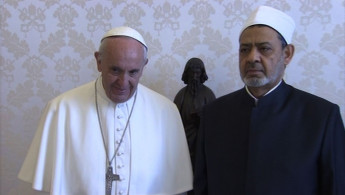Pope meets top Egyptian cleric
The first Vatican meeting between the leader of the world's Catholics and the highest authority in Sunni Islam marks the culmination of a significant improvement in relations between the two faiths since Francis took office in 2013.
"Our meeting is the message," Francis said in a brief comment to a small pool of reporters present at the start of his meeting with Sheikh Ahmed al-Tayeb.
In a statement on the trip, Al-Azhar said Tayeb had accepted Francis's invitation in order to "explore efforts to spread peace and co-existence".
The "very cordial" meeting lasted around 30 minutes, the Vatican said in a statement after the talks.
Tayeb's decision to fly to Rome, unexpectedly announced last week, followed the easing of serious tensions that marked the reign of Francis's predecessor, Benedict XVI.
Ties were badly soured when the now-retired Benedict made a September 2006 speech in which he was perceived to have linked Islam to violence, sparking deadly protests in several countries and reprisal attacks on Christians.
Pope John-Paul II met the then-grand imam of Al-Azhar in Cairo in 2000, a year before the September 11 attacks on New York transformed relations between the West and the Islamic world.
He came under fire for comparing boycotting elections - not viewed as fair by many international monitoring groups - in Egypt to "disobeying one's parents".
Tayeb, a supporter of the military-backed Egyptian regime that came to power after overthrowing President Mohamed Morsi in 2013, has spoken of a need to develop a new "religious discourse" in Egypt.
"We need to focus on human values and concepts we need in our societies, such as tolerance and social justice," he said.
"There is a plot against Islam and the Egyptian dream, that aims to destabilise the country and its people."
Egypt's President Gamal Abdel Nasr brought al-Azhar university under state control, with most of its leaders and scholars being appointed by the government.
Ahmed el-Tayeb himself was appointed by Mubarak and was supportive of the current President Abdel Fattah al-Sisi's military coup in 2013.
Over the years, Egyptian religious traditions such as Sufism and its discourse were brought under the state's umbrella in an attempt to build popular support for the government, and lend the authorities spiritual credibility.
Many of al-Azhar's students, meanwhile, are supportive of former President Mohammad Morsi, with students holding massive sit-ins after the military coup.
Students have also reported harassment and abuse at check points around the university.
Agencies contributed to this report.





 Follow the Middle East's top stories in English at The New Arab on Google News
Follow the Middle East's top stories in English at The New Arab on Google News
![The UAE is widely suspected of arming the RSF militia [Getty]](/sites/default/files/styles/image_330x185/public/2024-11/GettyImages-472529908.jpg?h=69f2b9d0&itok=Yauw3YTG)
![Netanyahu furiously denounced the ICC [Getty]](/sites/default/files/styles/image_330x185/public/2024-11/GettyImages-2169352575.jpg?h=199d8c1f&itok=-vRiruf5)
![Both Hamas and the Palestinian Authority welcomed the ICC arrest warrants [Getty]](/sites/default/files/styles/image_330x185/public/2024-11/GettyImages-2178351173.jpg?h=199d8c1f&itok=TV858iVg)